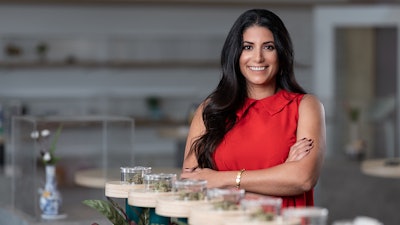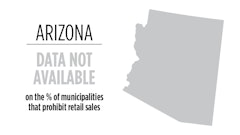
Lilach Mazor Power, founder and CEO of Giving Tree Dispensary, a medical and adult-use cannabis business based in Phoenix, announced last week that she has taken on a new role as president of the board of directors for the Arizona Dispensaries Association (ADA).
The organization, which officially launched in 2015, comprises state-licensed dispensaries, brands, distributors, testing laboratories and ancillary businesses that serve the industry.
Here, Power reflects on the current state of Arizona’s cannabis market and what’s to come for business operators in 2023, which she describes as a year that the industry should go “back to the basics” in the wake of oversupply and price compression.
Melissa Schiller: Can you provide some general background on the Arizona Dispensaries Association and its overall mission?
Lilach Mazor Power: Arizona Dispensaries Association (ADA) unofficially started in 2013 and then became a structured association in 2015. Arizona legalized medical cannabis in 2011, so it is impressive to see the industry recognizing the need for an association so early in the program.
The mission of the ADA is to promote and advocate for a safe, consumer-focused cannabis industry in Arizona. We currently have hundreds of members, representing more than 70% of the licenses in Arizona.
ADA is a unique association in our industry. We represent all types from the smaller cannabis businesses to the largest cannabis companies, promoting the same goal—to advance the Arizona cannabis industry through political advocacy, public education and professionalism. ADA proudly includes cultivators, manufacturers, infusion companies, [and] state-authorized labs as well as non-plant touching ancillary businesses who support the industry.
MS: Can you comment on this achievement of being the first female president of the association’s board of directors?
LMP: I’m honored to be the first ADA female board president. The industry has made great progress, but we still have work to do when it comes to diversity. In Arizona, I am one of the only women-owned license holders. That’s not a great statistic considering we are a 10-year-old industry. That being said, it is great the association, and the Arizona industry, completely embraced me as a woman leader. I love being a part of this market, and I am proud to be the president of the association. I always hope I make small differences in women’s lives, and the world my boys are growing into. It’s progress, not perfection.
MS: What are some of the biggest challenges facing Arizona’s cannabis businesses?
LMP: Regulation is top of mind when I think about challenges in the cannabis industry. Beyond the federal level, we face local rules and regulations that can affect our industry—customers, employees and businesses. We are always keeping our finger on the pulse. We’re also facing an oversupply in Arizona which has [caused] price compression and a significant margin shrinkage. I’m hoping companies will realize no one is winning in this race to the bottom and start creating targeted brands that create loyalty beyond price.
We are definitely dealing with regulations on labeling, with what needs to be on the label. Is a QR code good enough? What information do we need to include? There are added warnings. The Department of Health is doing a great job, but they’re learning as much as we are. What the consumer needs to have access to on the label has been a struggle, and that could mean we order 70,000 boxes of something and then three months later, we learn that we need to add something to the label or something on the box. You can use it, but you have to add a sticker to it because not everything is included. Or [it’s] pregnancy warnings or testing [information], and now we’re having to add the delta-8 and delta-9 [THC potency]. What kind of labeling do we need for that so that the consumer knows the difference between cannabis-derived cannabinoids and hemp-derived cannabinoids?
We are dealing with price compression. I think the oversupply is a big issue in many markets. It’s just not a sustainable business model. What we’re doing is finding the value that our customers can get. We’re still in competitive pricing, but not only giving-volume-up pricing. So, that could be a loyalty program that people can earn [rewards], service or knowledge, complimentary one-on-one [sessions] with our consultants—there are a lot of things that our community loves us for and [they] will choose to come to us if we’re competitive but not necessarily operating The Dollar Store model. That could be hiring veterans and women locally or being a part of our community and volunteering and raising funds for charities in our communities where we operate, supporting our artists—things that people see value in and want to be a part of.
MS: What are you most excited about in Arizona’s cannabis industry, or what are some of the biggest opportunities that exist for businesses in the state?
LMP: Arizona is a great market! We are growing year over year. Our adult-use market is still in its infancy—we are seeing more adults being open to [trying] cannabis. We also see more than 40 million tourists visiting Arizona annually. There’s enormous potential here! This is why I am excited for ADA to represent over 70% of our Arizona market. Realizing the opportunity, we can have successful, thriving businesses that serve our customers and employees in a positive and meaningful way.
MS: What are some of your goals this year as president of the board of directors for the Arizona Dispensaries Association?
LMP: I want to continue uniting the industry—representing brands, growers, manufacturers, license holders, labs, ancillary services and more. It is important to continue the conversation and listening to create a unique environment like we have in Arizona.
I want to protect our medical program, which is why we all got involved: the medical benefits of this plant. I do not want to see it disappearing like other states have seen. I want to educate people on different levels—our officials on how we operate, who we are and how people benefit from cannabis. I want to educate our adults on the benefits of cannabis, educate parents and brands on the importance of keeping your cannabis out of reach for child safety. I want people to understand cannabis could be a great career choice. I want to protect what we have created in Arizona, for our customers, employees, businesses and our association.
What we’ve seen in other markets is once it’s flipped to recreational, a lot of patients don’t bother to get their medical cards. There are benefits to getting a medical card. Of course, it’s the cost—you don’t have the extra tax. You can buy larger doses. So, for me, it’s [about] not losing our medical program because this is why we all started it—when we started to jump into the cannabis industry, we thought about the medical properties of this plant. It doesn’t matter if it’s for relaxing or sleep or cancer—there are medical properties to the plant. And I want to make sure that people still have the medical access that they need for a better cost as patients.
MS: What are some of your goals for your own cannabis business, The Giving Tree?
LMP: This year we are going back to the basics. The dispensary is focused on our core business, what we do best, why we started—our customers, our employees, our community. 2022 was a tough year, full of “noise”—we are silencing it all.
We love being a small business, we love being part of the community we operate in, we love what we do. Small businesses are easy to pivot and that’s what we are doing. I am excited to run this business that way we all enjoy it, where employees are smiling and laughing and growing with us. I am also an entrepreneur at heart, so I know I need to continue to innovate and build businesses. I’m looking forward to focusing my energy on our cannabis for menopause line. We’re changing women’s (and their partners’) lives, and I want to bring it to every woman going through perimenopause and menopause. That is my focus this year.
I think what the industry has gone through is belated growth, in a way. We had the COVID year that happened in 2020, and while other businesses saw declining sales, the cannabis industry as a whole saw increasing sales. More people had realized that cannabis can help them survive what we all went through in 2020, so we actually have seen growth in our market. And in Arizona, 2021 was the year we went recreational, so we had two years of people doubling and tripling and quadrupling their business. That created an environment that we thought was going to last, and of course, it didn’t.
People saw the growth and started building grows everywhere, and now they’re all coming to life in 2022 and 2023, and now we’re seeing oversupply. [Operators] really grew the expenses of the business, not realizing that there is an expiration date for this growth.
I think a lot of us, 2023—it’s not just us as Giving Tree, I see it everywhere—that people are realizing that this is a time to go back to basics. This is a time to go back to our vertically integrated business. We grow, we sell, we’re lean, we’re a start-up mentality, we do everything, and [we need to] just become a lean, profitable business again without trying to grab every opportunity that comes our way. So, different businesses, different going back to basics, but I think we’re all going to go through this exercise.
MS: Where do you see Arizona’s cannabis market in five years, or what are some of your general predictions for the industry as it matures?
LMP: Five years… That’s like 35 years, right? I think the Arizona cannabis market will continue to grow. I think more people will incorporate cannabis into their lifestyle. I think minor cannabinoids, terpenes, combined with other medicinal plants will take over our current basic formulation. I think we’ll see some brands leaving the market because the price compression here will drive a few out of business. We will continue to see mergers and acquisitions, but I believe companies will be smarter now, looking for healthy businesses instead of chasing top line revenue. The conversation is changing, and this is a good sign the industry is growing up. I’m excited to see it growing.
Editor’s note: This interview has been edited for style, length and clarity.

























